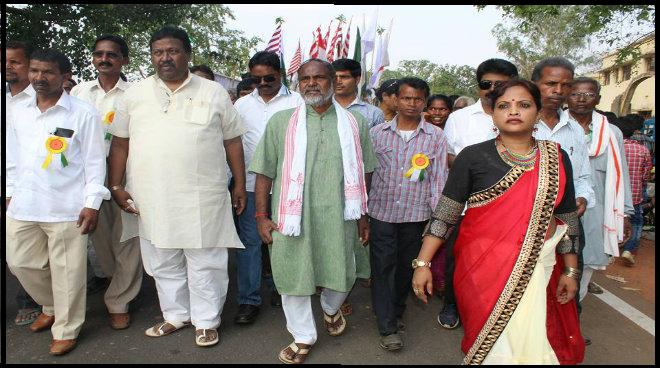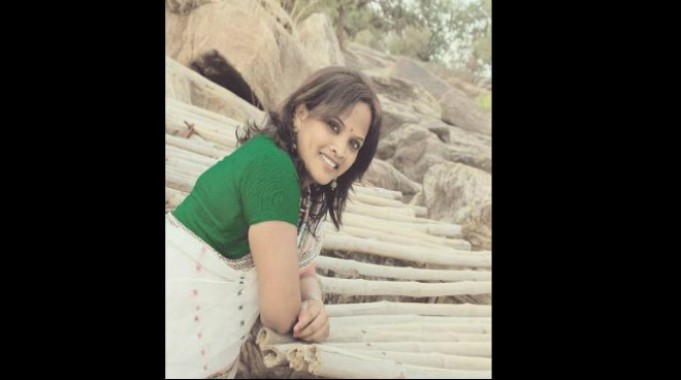“I write what I see and experience”
Barkha Larka is an adivasi journalist and activist from Jharkhand who was recently given the Vishnu Prabhakar Award for youth engaged meaningfully in their chosen area of work. Lakra received the award for her work in highlighting issues affecting the adivasis of Jharkhand and particularly the most marginalised tribal women.
Lakra has a BA and MA in political science from Women’s College, Ranchi and Ranchi College (Ranchi University) and an additional master’s degree in rural development from IGNOU. She belongs to the Oraon tribe. Hers is a unique female adivasi voice in a space dominated by non-tribal academics and journalists. She was interviewed in Delhi on 19th June 2016
Swati Parashar (SP): How did you hear that you have been given this award? What other recognition has come your way?
Barkha Lakra (BL): I received an email about having been given this award. Prasun Latant, senior journalist of Jansatta, who said that he was going to nominate me, contacted me. He said that my writings were having an impact and people were reading them. I have been writing on social justice issues in tribal areas. I think my biggest awards come from people when they appreciate my stories and tell me that it inspired them to do something different. Formal recognitions also encourage me to continue my work. Next month in July, the Parha Sanchalan Samiti, Bero, is going to honour my work. I have also received media fellowships, which are helpful because most of my work is unpaid and self-funded.
SP: Tell us about your journalism and writing. Who is your audience?
BL: I am an independent journalist and have been writing for almost all the leading media outlets in Jharkhand, Bihar, Bengal and Chhattisgarh. I have written for Johar Chhattisgarh, Johar Jharkhand, Dudhwa Live,Dalit-Adivasi Duniya, Jansatta, Prabhat Khabar, Dainik Jagran, and Hindustan. A small group of us have also started our own self-funded paper called Khabrein Udan of which I am the editor. I write what I see and experience and am particularly interested in traditional self-governance systems of adivasis and women’s issues. I am trained in political science and am able to analyse most things from a political point of view. I am interested in highlighting the real struggles of adivasi women and how they have been marginalised even though the state of Jharkhand was created for adivasis.
The oppression of adivasi women happens not just in a political and economic system that continues to displace adivasis and exclude them in matters of governance, but also at the hands of adivasi men and the patriarchal customs that have become an integral part of adivasi lives. I write for adivasi women and for all underprivileged women. I think women’s lives are interconnected and even in the best of societies they do not enjoy the equality and privileges of men.
SP: What inspired you to get involved in these issues?
BL: The oppression of the adivasis is well known and I have witnessed for myself the displacement of tribal people, the trafficking of women and pushing them into brutal domestic and sex work in other cities; unemployment, illiteracy and related hardships. Tribal women and children particularly need space and protection in displaced areas. So what you see in a person always moves and inspires you.
Then there is the larger issue of tribal history and popular culture that valourises only men, and women have been conveniently written out of those narratives. Everyone knows Birsa Munda, Sidhu Murmu and Kanhu Murmu (Sidhu-Kanhu), Jaipal Singh Munda, Tilka Manjhi, and Tana Bhagat. There are universities, airports, public utilities and government schemes in their names to keep their memory alive. How many know of those tribal women who have consistently fought alongside men? There is little to commemorate their heroism, sacrifices and struggles.

Lakra at the forefront of the public event on Adivasi culture, women and traditional governance systems, organised by Parha Jatra in Bero, Jharkhand on 3rd June 2016.
Has anyone heard of Singi Dai and Kaili Dai who fought against Sher Shah’s men, dressed as men?[i] Maki Munda, Phulo Jhano, Devmani and several others need to be recognised as well. Where are their stories? There is literally nothing to remember their contribution. Adivasi women also need heroes and role models. In 1943, when Jaipal Singh Munda laid the foundation of the Jharkhand Movement, 60,000 adivasi women walked from Chhotanagpur to Purulia. For their journey, they raised money from selling Birsa Munda’s memorabilia. Nothing exists to remember them and their extraordinary contribution towards the political empowerment of the adivasis.
When the All Jharkhand Students Union (AJSU) was started in the mid-80s, many women were part of it. There were FIRs against 46 women for anti-government activities and 145 were jailed for demanding a separate Jharkhand state. Nothing is heard about those women. When Jharkhand was created in 2000, only three women were elected as MLAs. Not much has changed today and out of 81 elected members in the Legislative Assembly, only nine are women. Women are not merely there to make banners and carry flags of political parties. If they can run homes they can run the state and country too!
Then the traditional adivasi systems of local self governance such as the Parha (of Oraon), Gotra Parha (of Munda) Manjhi Pragnate (of Santhal) and Manki Munda (of Ho) have no place for women. I have been working to raise awareness about these systems and how they can be better with women's inclusion and participation. Don’t say women are equal as a lip service because you don’t actually mean anything. Women work twice as hard as men in the fields, they have little or no education, no financial security, and on top of that, they are subjected to all kinds of violence, not just by the state structures and displacement but also because of dowry and witchcraft, etc.
The most important trigger point for my writing and activism has been my own experiences of violence at the hands of my husband, Gladson Dungdung who claims to be a ‘human rights’ activist. I was not human enough for him to deserve rights. The matter is pending before the Judicial Magistrate Court in Ranchi. My own fight for justice has been fraught with challenges and it inspires me to speak out for those who are not as privileged as I am. In fact, during the period that I was married, I could not do much and only worked for him. I was quite cut off from my work and community so it is good to be back where I belong
SP: What are the significant challenges for adivasis, and women in particular, in Jharkhand at the moment?
BL: Jharkhand, since its birth in 2000, has had 15 chief ministers and three periods of President’s Rule. That sums up the story of a state that was created to empower adivasis but has become a tragic story of their displacement, disempowerment, corruption and misrule. The adivasi leadership (mostly males) have come from the Santhal tribe and have done nothing for the tribals except to perpetuate their hold on power.
My own case demonstrates the difficulties adivasi women face in accessing legal resources and justice. I am well educated and informed but I have struggled to get people on my side and assist me. Initially even the police were not willing to do anything. They prefer to side with men in these cases. There are many other women like me who have experienced worst forms of violence and they don’t find the support within their families and community to take the fight to the court.
The biggest challenge is for women to reject false ideas of ‘shame’ and ‘honour’ and take control of their lives. When I started writing on Facebook and other media about my experiences, Gladson and his well-wishers advised me that this was a personal matter and should not be made public. What is personal about being beaten by your husband, as I was? Some even suggested that I am bringing a bad name to the adivasi samaj. But isn’t it important to recognise the wrongs and then work to change them instead of turning a blind eye under the false cover of ‘honour’?
In our adivasi community we have a saying that if a woman dances in 10 courtyards (akhras) she brings dishonour to herself and her character is questioned; if the man dances, his honour and character are untouched. This attitude must change.
Another issue is that women do not ask for rights mostly because they compromise for their children. They need to make children their strengths and bargaining power, not weaknesses. This can only happen when they are financially secure and are capable of looking after their children.
SP: What are the other issues?
They are mostly cultural, economic and political, and are interlinked. At this point, dowry demands and related domestic violence are very high. Adivasis never had a dowry system. Why have they adopted this practice, which demeans and oppresses women? Naming women dayens (witches) and killing them is another terrible practice among the adivasis. Sometimes they are accused of witchcraft towards their own children or family members. How is that even a possibility? Drinking liquor is a huge issue. Outside my house in Ranchi I see young teenagers drinking. In many cases their life span is reduced to 30 years. I think a liquor ban will be useful in addressing other problems that women face in Jharkhand, such as domestic violence. Bihar has shown the way and women are reporting that a liquor ban has had a positive impact on their lives.
All of this can change when women get equality in the political space. In the Nagri andolan,[ii]adivasi women were first at the forefront and one even died in the police action in 2012. But when it was time to elect a mukhia recently, it is again a man.
Why don’t men come forward to fight for women’s rights? There is a lot to be done and men have to take some responsibility for the state of affairs. I think the traditional adivasi systems of self-governance were far more democratic and must be revived; women have a big role in that.
[i] This is probably referring to the battle at the Rohtasgarh fort in 1538 when Sher Shah Suri fought against the local Kurukh people to gain control of the fort. Singi Dai was the local princess who with her friends, Champa and Kaili, dressed as men and fought against the Afghan soldiers. The Oraon folk songs sing the bravery of these women, although they lost the battle.
[ii] The Nagri Andolan was an anti-displacement battle between the state government and the adivasi farmers of Nagri, a place 15 km from Ranchi. The conflict happened over 227 acres of land allotted by the government for the building of campuses for the Indian Institute of Management (IIM), Indian Institute of Information Technology (IIIT) and National University of Study and Research in Law (NUSRL). Farmers saw it as land grabbing and were offered very poor compensation figures,
Dr. Swati Parashar is a Senior Lecturer, Politics and IR Program, at the School of Social Sciences, Faculty of Arts, Monash University, Australia and Visiting Fellow, Centre for the Study of Developing Societies (CSDS), Delhi.







